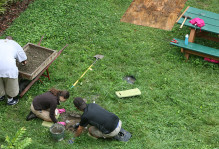A Curious Topic (by which I mean specifically that my topic is curiosity)
Last fall I had the honor of being the guest speaker at the academic recognition ceremony for a public high school in northern Virginia. The guidance counselor who extended the invitation was gracious enough (or foolish enough) to give me free reign in terms of topic and message, and this is what I said:
At the end of October we lost a great voice—one that had been projected on radio, by television airwaves and in print for several decades—when Studs Terkel died at age 96.
Now students, many of you may not be familiar with the work of Studs Terkel. At a minimum I trust that you can agree with me that his name was incredibly cool. When he chose it as a young man, he already was forecasting the trend for choosing funky email addresses and IM handles that express personality, the kinds of titles that make my colleagues and me take notice when we see them on college applications. Thank you very much, TubaWriter, RainMonkey and TakingBackBeth, each of which would have worked extremely well for the names of rock bands if they hadn’t been wasted on gmail. (Note: In order to protect the innocent, I fudged on the domain name—none of the three above actually used @gmail.com.)
But back to Studs Terkel. The consensus opinion in his obituaries and in the retelling of stories by those who knew him was that what made Studs so successful, Pulitzer-Prize-level successful, was that he asked insightful questions, and he listened well. He was, in other words, a curious person. And I don’t mean that he was strange. I mean that he he was eager to learn.
That quality worked for radio, on television and in his books, all media through which he made listeners, viewers, readers interested in the lives of others—often our society’s overlooked figures—be they the Giants of Jazz, the street dwellers of Chicago or the veterans of World War II—because he was interested in them. His curiosity sustained him and excited ours. Studs Terkel even famously said that he wanted his epitaph to read, “Curiosity didn’t kill this cat.”
And curiosity, I suggest to you today, not only will not kill you, but it will enable you to lead a fuller life. I know this sounds like the airy stuff of hallmark cards or framed needlepoint, but in my experience working with prospective college students, reading their applications to William and Mary, and seeing them on our campus after they enroll, I am convinced that curiosity is what distinguishes those students who are merely successful from those students who are fulfilled.
And fulfilled is itself a curious word to use when describing the value of curiosity, because its value comes precisely from not being satisfied, from not being filled, from wondering more, from a willingness to learn from unexpected sources. Curiosity begets restlessness, but it also instills a love for the searching that exceeds the need for the finding.
Some students see a graph in a science class, and the closest they get to curious is wondering whether it will be on the exam. You may know some of those people. Plenty of them still get good grades. One student saw a graph and wondered about it for more than thirty years. Over the course of a life in public office, he still wondered about it, asked experts about it, projected his interest in the matter. Then after leaving public office he went on to lead the production effort for a film called An Inconvenient Truth. It won an Academy Award and raised the public’s consciousness of global warming, all on account of Al Gore’s persistent curiosity about a graph of atmospheric carbon dioxide concentration by year, which he saw in a college classroom.
Some students have a primary interest in a particular area, computer science for example, and they believe that anything outside of that primary interest is unworthy of their attention. The closest they get to curious is wondering how many more requirements not in the field of their major are left before they finish their degrees. One computer science student found himself riveted by—of all things—a calligraphy course at Reed College. He wondered how the aesthetic of letters might relate to how we interact with personal technology, and that curiosity ultimately influenced how Steve Jobs designed the look and feel of what we now know as the Mac operating system. In a commencement speech he delivered at Stanford, Jobs credited that calligraphy class with playing a fundamental role in how typography would be used by him later at Apple.
Here comes the part of this speech where I give you a specific piece of advice.
A curious mind is not always the most focused mind, and while balance is best, I submit to you that erring on the side of curiosity will serve you better in the long run than erring on the side of focus. This has become more difficult for us of late, and we’re not helped by our technology. A google search or a wikipedia query brings us directly to specific information to the exclusion of the peripheral.
Nicholas Carr makes this point vividly in a recent cover story for The Atlantic. In the article, entitled “Is Google Making Us Stupid?” Carr laments the evolution of his own style of reading by saying that he once was “a scuba diver in the sea of words. Now [he] zips along the surface like a guy on a Jet Ski.” He, like many of us, like me specifically, worries about moving from a casual ability to lose himself in long books to taking obsessive notice of where the scroll bar is on even a mere page of web text.
In other words, the nasty combination of abbreviated attention and narrowed scope, both cultivated by the terse, direct information so easily available to us makes us into people who move from point to point without taking the time to explore what’s beneath. Brevity and specificity, often touted as virtues, can constrain our curiosity if we stop diving deeper. I see this troubling pattern sometimes in my own behavior, and I see it in plenty of successful high school students who are so busy moving from class to club, from sport to service, from SOL to SAT that they fail to be reflective, inquisitive and open.
If Studs Terkel were a high school student today, would he be taking the time for, and sustaining the interest in, a long and personal conversation that had no explicit purpose beyond his earnest curiosity about another’s experience? I hope so, and I hope you will. All of you have the intelligence and the work ethic to be successful. You’ve proven that already, and it gives you an enormous advantage. What I wish for each of you is a sustained curiosity that compels you to ask questions, to embrace detours and to project interest.
My colleagues and I call this love of learning when we see evidence of it in an application for admission, but the foundational quality is curiosity, and it will reward you more than an academic letter, more than admission to the college of your choice and far more than anything else I might say to you this morning.
Congratulations. Best wishes for a bright future. And stay curious.
– Henry Broaddus




No comments.
Comments are closed on posts older than one year, but we still want to hear from you. If you have a comment or question for us, please email admission@wm.edu.